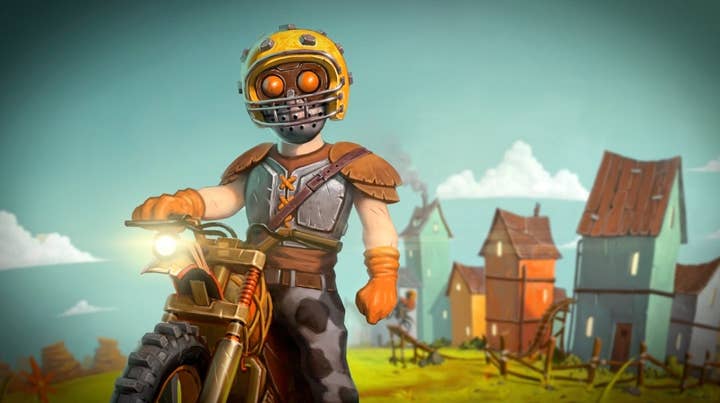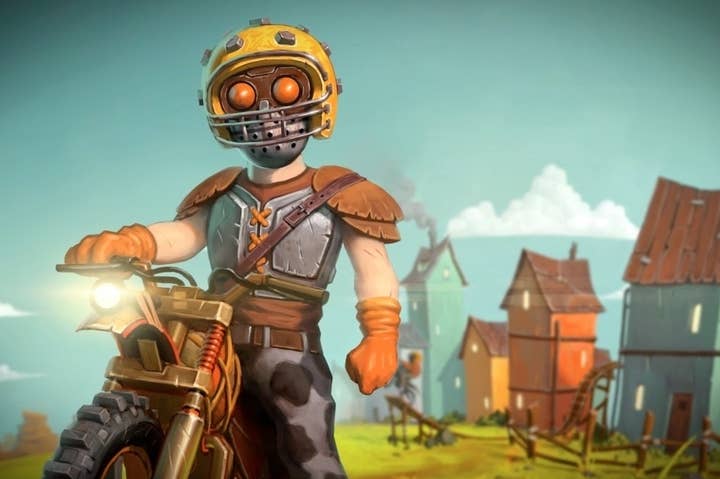Trials and Error: How RedLynx is Building a Hardcore Brand
The Helsinki studio hopes to balance mass market, mobile, console and core with new Trials games
Helsinki studio RedLynx is best known by far for its punishing motorbike physics title Trials HD, which brought the studio both fame and a rampantly appreciative fanbase when released for XBLA in 2009. However, like fellow Finns Rovio, the developer had already established an extensive and respectable back-catalogue by the time it released its first hit. Trials itself had already seen the light of day as both a flash game and a full PC release, alongside a Warhammer 40K squad game for DS and a raft of N-Gage titles, including the surprisingly brilliant Reset Generation - an IP still fully owned by Nokia.
Nonetheless, it was the breakout success of Trials which brought the company recognition, exposure and, eventually, an acquisition from Ubisoft. It's the IP which I hear referred to more than once as the 'lifeblood' of the company during my visit to the 100 strong developer, so it's no surprise that two more games in the series are in the works: Trials Fusion for next-gen consoles and Trials Frontier for mobile, both due next year and both backed by the marketing muscle and global presence which the Ubisoft umbrella provides.
Joining a major publisher is obviously a big deal for any independent studio, but RedLynx's founders have never given the impression that they like taking orders. Is there any trepidation internally about what the move may mean for creative independence, going forward? Is there any fear that RedLynx, a name already synonymous with the Trials brand, simply becomes a sequel factory, churning out endless variations on a theme? MD Tero Virtala doesn't seem too concerned about the new paymasters.
"I can start by talking about what has changed," Virtala replies in flawless and softly accented English when I ask him how heavily the French publisher's hand lie upon the tiller. "Many things have changed; some of the fundamentals have stayed the same as they always were with RedLynx. For years and years we've been developing small and innovative games - all together we have made over 100 games.
"For many of the people working here this is now a truly international organisation. The development possibilities are huge"
"In a sense we started seeing that mobile was going to start booming in a big way and we had some competence with mobile development, not just in iOS but in the way our games had utilised the online digital space on console. We have reached a certain point, having developed games for ten years, where we'd had a lot of learning. We had been looking for the opportunity to take the next big step. Not to develop another innovative game for one platform, but trying to make a real innovation in a big way - trying to reach a wider audience by going multiplatform and trying to make something that really stands out. In a way, be better, more different, more innovative to a wider audience.
"So that was our situation about two years ago. We were thinking, 'how do we do this? Can we do it on our own? Should we collaborate more closely with existing partners or consider becoming part of a bigger publisher?' We were evaluating all of these options, but the discussions with Ubisoft felt like they were the right direction."
"Obviously as the MD of RedLynx I don't know if I could ever say anything else," Virtala admits, "but we had 45 employees when we joined Ubisoft, now we have 105 people. In that two years, we've only had two or three, a maximum of four, employees leave us. People have obviously been quite satisfied. It's added even more ambition to our games and we now have the resources to try and accomplish that. For many of the people working here this is now a truly international organisation. The development possibilities are huge, there are so many more options."

For Kim Lahti, the team's production director, becoming part of Ubisoft is all about being able to push the creative envelope whilst also offering your staff the room to grow - and to settle down.
"Being part of Ubisoft gives us the stability of a big company," he adds. "It allows us to think on longer terms. We've always focused on making people feel happy and motivated, but of course having this sort of bigger context lets us do that even better. They're all enthusiastic anyway but as you grow older together you have to make sure the things are in place to keep them happy and make sure they stay."
Antti Ilvessuo, RedLynx co-founder and creative director, has a reputation for speaking his mind, but he also seems impressed with Ubisoft's supervision. "Ubisoft basically trusts us, they trust us being who we are. I think that's the case with Ubisoft generally, that they trust their studios, and I think that shows in their games. Sometimes being part of Ubisoft makes us feel more independent than we used to be.
"When you're a small indie, people look at you from the outside and it may seem amazing, but people don't often see behind the curtain. It's a big job trying to secure all the financing, make all those deals and establish all those support functions when you're a small player. Trying to handle all that with 30 or 40 people is hard: it takes five or ten people to do all that alone. Ubisoft is really active in those areas so our people have had the possibility to fully focus on developing the games, most of those functions are fulfilled by the parent company."
"I think that's absolutely true," Virtala agrees. "We have seen in our experience of the other publishers, which are all unique in their own ways, that they all have their own strengths and weaknesses. But you can see in Ubisoft this focus on innovation - which does include risk. Part of the culture seems to be that you have to be willing to take some risks to innovate. Even if that first creative experiment doesn't lead to great results, it definitely leads to a lot of learning.
"In addition to that, Ubisoft emphasises inter-studio collaboration and knowledge-sharing. That happens a lot, so everyone benefits from the things that people learn, which increases the likelihood that some of these innovations lead to commercially successful results.
"I think that's the case with Ubisoft generally, that they trust their studios, and I think that shows in their games"
"So far I think we have been very focused, not only on Trials, but on developing some other mobile games. Even though we've grown so much, we still need other studios to help us out sometimes, so at least for the time being we've needed everyone we can get to make sure that those games get developed at the right level of quality.
"We have been trying to develop more and more towards a future where there's a truly cross-platform approach. I think one of the opportunities we can offer our developers is that there aren't many other places which can say they're truly developing for mobile and console games. We try and develop competent people who can develop for both areas. Of course, if you take a snapshot of what people are doing now there are people who are focusing on each platform."
RedLynx is no stranger to mobile development, but with Trials attracting such a fervently 'hardcore' audience, transitioning the brand might cause a few problems. How has the shift been seen by the community?
"Accurate physics are a massive part of it being the same game," says Kim. "When people get hold of the mobile games they'll be able to see that that hasn't changed. There are new aspects, obviously, but we have made sure that all of the hardcore techniques used to handle the bike work in mobile too, that's a core part of the IP. That dictates how the game plays.

"It's touch controls. We've had a lot of discussions about how to do it, because precise controls are a big part of Trials. We've talked about a lot of different ways to do it, but in the end we went with touch controls but we really focused on those for months. The last eight months or so have been all about fine-tuning touch controls and physics. That's the key: tuning the small things properly."
"Antti has been very keen on us making sure we stay absolutely loyal to the core values of trials," says Tero with a smile to his creative director. "For a long time we had the idea that there'd be some completely new elements that we could build on top of that. In mobile the potential audience is so wide that we know there's the opportunity for a much bigger audience to get involved in the game, especially with the way that the story expands and pulls people in deeper. It's still loyal to the absolute core experience of Trials, but it's still expanding that into something new.
"I think that for mobile gaming as a whole it's going to be really exciting, expanding that into a bigger meta-game, combined with a very precise and physics driven game. On mobile you get something like 1000 new games a day, so we know we have to do something innovative, take some risks and differentiate."
"On mobile you get something like 1000 new games a day, so we know we have to do something innovative, take some risks and differentiate"
Finland, and Helsinki in particular, is seeing a huge gaming boom, fuelled largely by the twin behemoths of Rovio and Supercell, but the majority of the country is braced for a recession which is only now starting to make itself felt in the region. Despite a few notable exceptions, investment cash is short on home soil, but money has flooded in from Asian companies keen to capitalise on the wealth of local talent. Clearly, signing up with a global publisher should do wonders for the studio's reach, but is the aim to build Eastwards or West?
"I think we're in an interesting position, both doors seem to be open at the minute," muses Virtala. "Seemingly we're stronger in the West with Trials but it's only been available on Xbox Live Arcade so we have had a limited market. Now we're coming to a number of platforms with the help of Ubisoft, with the biggest game we've ever created - I think that will help us expand in the Western market. At the same time we're coming out with a big mobile game. Ubisoft is present in all of the global mobile markets so I think that's going to help as well.
"We're collaborating closely on Trials with Ubisoft Shanghai, which is helping to develop the business side. The doors should be open to the Asian market."

